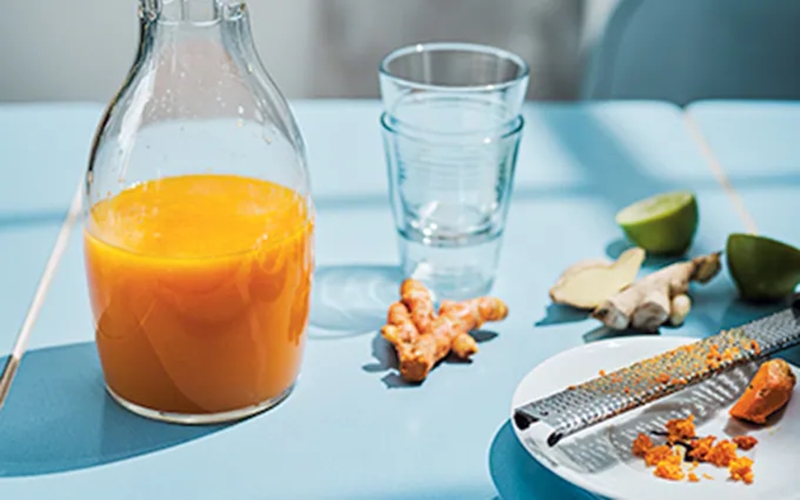An expert has revealed how just half a teaspoon of turmeric, found in any kitchen cupboards, can have ‘amazing benefits’ – including lowering cholesterol. Research suggests this spice may even rival statins when it comes to reducing harmful cholesterol levels.
Turmeric, which Dr Eric Berg DC, an expert in healthy ketosis and intermittent fasting, swears by. Taking to YouTube, where his channel boats over 12 million followers, Dr Berg, also known as The Knowledge Doc, unpacks the myriad of health advantages offered by turmeric and explains how to turn it into a refreshing drink.
According to the specialist, concocting a simple turmeric water mix isn’t just a delightful tea alternative you could sip each day, but it’s particularly beneficial for those wrestling with high cholesterol, reports Surrey Live. Dr Berg advises either kicking off your morning with it or making it part of your pre-slumber ritual.
Alternatively, swap out your morning caffeine hit or sugar-laden tea for this superfood-infused version, or even take it ahead of meals. Eitherway the benefits of turmeric are significant.
In his video, Dr Berg claims: “One study found that curcumin was just as effective as ibuprofen at reducing pain from arthritis without side effects. It’s also shown to be as effective as aspirin.”
Curcumin, the active ingredient in turmeric, has been found to block inflammatory enzymes. In a study, those who consumed 2g of turmeric daily for six weeks saw improved pain relief when walking and climbing stairs, with their knee function improving more than those who took 800 milligrams of ibuprofen daily.
The expert added: “Another study showed that curcumin had comparable results to Prednisone in reducing inflammation for rheumatoid arthritis, asthma, and IBS. It has also been shown to produce antidepressant effects similar to Prozac and Zoloft.
“Curcumin has anti-diabetic properties and effects similar to Metformin. It also has anticoagulant properties similar to aspirin and Warfarin.”
Further studies have indicated that curcumin could positively affect glucose tolerance and lipid profiles. A 2019 study revealed that curcumin improved insulin sensitivity and lipid profiles in rat models of type 2 diabetes.
Dr Berg added: “Research has shown that curcumin has benefits similar to statins and can help reduce LDL cholesterol and triglycerides. One study compared curcumin to anticancer effects of 5-fluorouracil, a chemotherapy drug.”
Curcumin can increase HDL-C, which is linked to a lower risk of heart disease. It can also reduce the effective doses of statins, which can help decrease the incidence of serious adverse reactions. Curcumin may also be beneficial to take alongside statin therapy for patients with disordered lipid metabolism.
High cholesterol levels are known culprits behind several serious health conditions, such as heart disease, strokes, and high blood pressure. Responsible for clogging arteries, high cholesterol is often the upshot of a diet high in fat, being overweight, smoking, boozing, or a lack of exercise, and can also run in families.
Strikingly, it comes without symptoms, meaning a blood test is the only method to diagnose this silent threat. Tackling high cholesterol involves switching to healthier eating habits, moving more, and sometimes even medication.
The doctor continued: “Turmeric has been shown to be as effective as anti-inflammatory drugs, especially for irritable bowel disease and digestive problems. It may also help reduce blood pressure and inhibit pathogens, especially fungi.”
The golden spice’s star ingredient, curcumin – a power-packed, inflammation-battling compound – is known for its potential to boost heart protection and slash heart disease risk. To make turmeric water, Dr Berg advises simply stirring half a teaspoon of turmeric powder, a bit of black pepper, and the juice of half a lemon into a glass of warm water.
If you fancy something creamier, he suggests: “Combine half a teaspoon of turmeric, one-quarter teaspoon of cinnamon, and a pinch of black pepper in a cup of milk or coconut milk. Heat the mixture and remove from heat just before it comes to a boil.
“You can also add turmeric to a smoothie with berries and kefir. If you have a cough, try drinking a cup of hot water with a teaspoon of turmeric and a tablespoon of raw honey.”
Before you start taking turmeric water, you should know a few things. While it’s packed with health benefits and could be as effective as some medications for certain people, it’s not a magic potion.
A balanced diet and regular exercise are key to staying healthy. Always consult your doctor before starting on turmeric water, especially if you’re on medication or managing a medical condition.
Curcumin is generally safe when taken in amounts less than 8g per day, but higher doses or long-term use may cause stomach upset or liver damage. Turmeric is likely unsafe when consumed in medicinal amounts by pregnant or breastfeeding women.
Turmeric supplements might also interfere with other medications and cause side effects like upset stomach, nausea, stomach pain, indigestion, rashes, hives, and ulcers. For more information, visit the NHS website.
Courtsey:- Charlotte Smith, The Mirror





